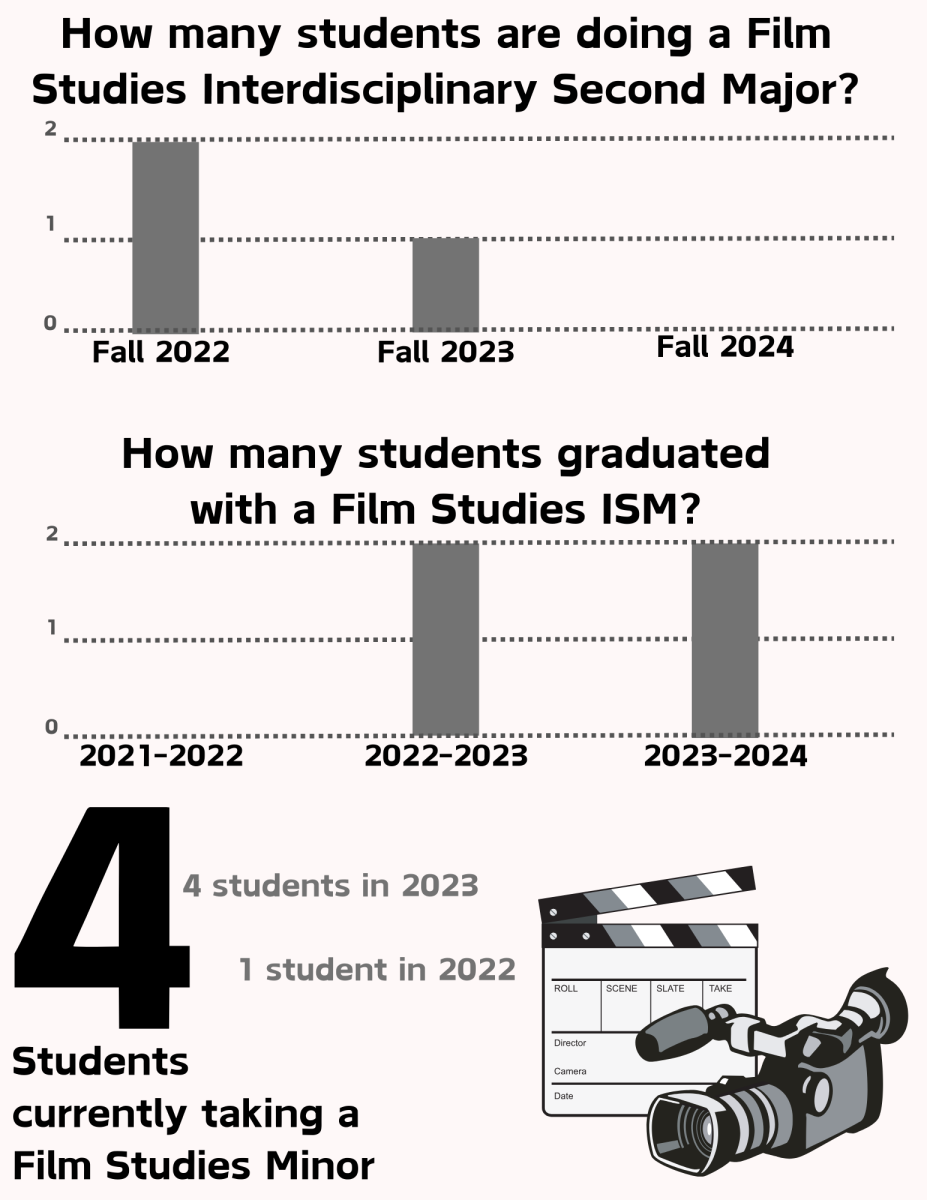As a sophomore at Trinity University with major declaration right around the corner, I’m facing the same choice many students do: deciding on a major. Since I applied to college, I’ve been passionate about majoring in both film and computer science, and I came to Trinity with these same goals. However, despite Trinity’s diverse course offerings, the university doesn’t provide a formal film studies major, leaving students like me to navigate alternative paths to study film here.
Offering a film studies major at Trinity would have several benefits, both for students and for the university itself. First, establishing a formal film studies major could attract new students interested in film who also value Trinity’s liberal arts approach to education. Trinity’s commitment to cross-disciplinary learning is well-suited to the study of film, an inherently interdisciplinary field that draws from communication, art, English and more. Southern universities aren’t known for film, apart from a few notable schools such as the University of Texas at Austin, the Savannah College of Art and Design and Emory University.
With Trinity being a liberal arts university, it would immediately be distinguished amongst these universities as the only one which may help draw in students who are interested in pursuing film with a liberal arts education.
Trinity already offers a considerable number of film-related courses that could support a film studies major. The current film studies minor includes 36 courses totaling 131 credit hours, with 25 courses being upper-division. This demonstrates that the necessary courses are already available, and formalizing film studies as a major would require little more than consolidating and structuring these resources.
A formal film studies major would also improve credibility for students pursuing careers in the field. Graduating with a recognized film studies major is often more easily understood by potential employers than a self-designed interdisciplinary second major (ISM), which can be confusing without further explanation. While Trinity’s high postgraduate employment rates suggest that students can likely succeed regardless, having a well-defined film studies major would only serve to improve that credibility and make students more competitive in the job market.
Currently, it is technically possible to major in film at Trinity as an Interdisciplinary Second Major. The ISM program allows students to design a custom major that fits their needs by combining courses from across departments. The program is actually a major reason I chose Trinity, as my admissions officer highlighted it as a way to pursue film here. However, if film studies technically can already be pursued through an ISM, why should Trinity go through the effort of creating it as a formally offered major? While this is technically true, the ISM process is complex and can be discouragingly time-consuming. Students interested in an ISM must find faculty advisors, select courses that meet all the interdisciplinary requirements, submit a detailed proposal and then get approval from both the ISM committee and the University Curriculum Council, something which most Trinity students don’t have the time to pursue.
While Trinity does allow students to pursue film studies through the ISM program, creating a formal film studies major would benefit the university. The liberal arts education at Trinity supports interdisciplinary learning, and the range of film-related courses currently available already aligns with the creation of a film studies major. While the option of an ISM is valuable, it can be too time-consuming and complicated for students, creating barriers to entry to those who are genuinely interested in studying film at Trinity. Offering film studies as a formal major would allow Trinity to streamline access to film and would make at least one student’s life (mine) a whole lot easier.
Trinity already offers a considerable number of film-related courses that could support a film studies major. The current film studies minor includes 36 courses totaling 131 credit hours, with 25 courses being upper-division. This demonstrates that the necessary courses are already available, and formalizing film studies as a major would require little more than consolidating and structuring these resources.
A formal film studies major would also improve credibility for students pursuing careers in the field. Graduating with a recognized film studies major is often more easily understood by potential employers than a self-designed interdisciplinary second major (ISM), which can be confusing without further explanation. While Trinity’s high postgraduate employment rates suggest that students can likely succeed regardless, having a well-defined film studies major would only serve to improve that credibility and make students more competitive in the job market.
Currently, it is technically possible to major in film at Trinity as an Interdisciplinary Second Major (ISM). The ISM program allows students to design a custom major that fits their needs by combining courses from across departments. The program is actually a major reason I chose Trinity, as my admissions officer highlighted it as a way to pursue film here. However, if film studies technically can already be pursued through an ISM, why should Trinity go through the effort of creating it as a formally offered major? While this is technically true, the ISM process is complex and can be discouragingly time-consuming. Students interested in an ISM must find faculty advisors, select courses that meet all the interdisciplinary requirements, submit a detailed proposal and then get approval from both the ISM committee and the University Curriculum Council, something which most Trinity students don’t have the time to pursue.
While Trinity does allow students to pursue film studies through the ISM program, creating a formal film studies major would benefit the university. The liberal arts education at Trinity supports interdisciplinary learning, and the range of film-related courses currently






